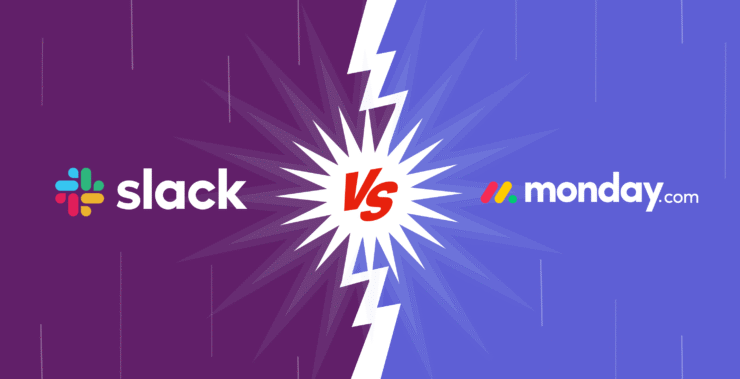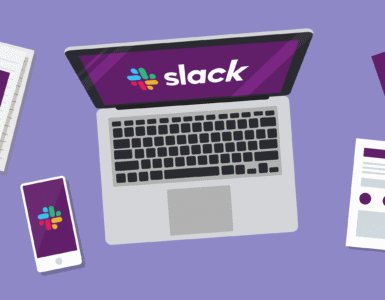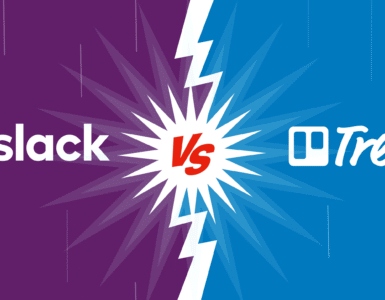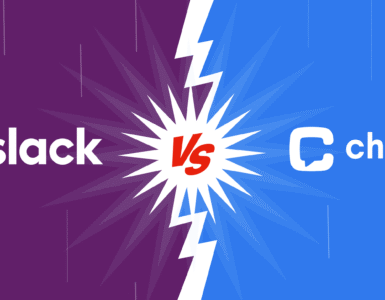It so happens that when it comes to managing workflows, communicating, and collaborating with teams, the right tool may just make or break productivity. Slack and Monday.com are two giants in the world of productivity apps, catering to somewhat different needs.
Slack is like the overly chatty coworker who never needs prompting to brainstorm, share ideas, and basically make communication flow. Meanwhile, Monday.com is that über-organizational project manager who makes sure everything moves along without a single missed step, down to every last minor detail. Both bring unique strengths to the table, but which one excels better in your team?
Now, let’s dive into a practical, no-nonsense comparison that shall help you decide. Spoiler alert – it depends on your team’s size, goals, and workflow style. Here’s what we found when comparing them side by side.
Looking for an all-in-one alternative?
Chanty combines the best of both worlds – seamless communication like Slack and built-in task management like Monday.com, making collaboration effortless.
What Is Slack?
Slack is a feature-rich communication tool designed for businesses and teams of all sizes. It excels in structured communication with channels, threads, and an incredible range of integrations. Think of it as the Swiss Army knife for team collaboration. However, its complexity can feel overwhelming for small or informal groups. Pricing ranges from free for basic use to a subscription model for advanced features.
Slack’s Pros:
- Top-notch communication: Easily chat with individuals or groups in real time.
- Integration with loads of apps: over 2,000, including Google Drive, Trello, and Zoom.
- Customizable notifications: never miss an important update, but silence the cat GIF channel when necessary.
- Searchable archives: find the past messages and shared files instead of digging through your emails.
- Cross-platform access: at your fingertips on the web, desktop, and mobile.
Cons of Slack:
- Overwhelming for large teams: sometimes, too many channels lead to chaos.
- Limited project management features: great to converse on, yet missing some robust task-tracking capabilities.
- Pricing: The free plan has very limited functionality, including 90-day message history.
Monday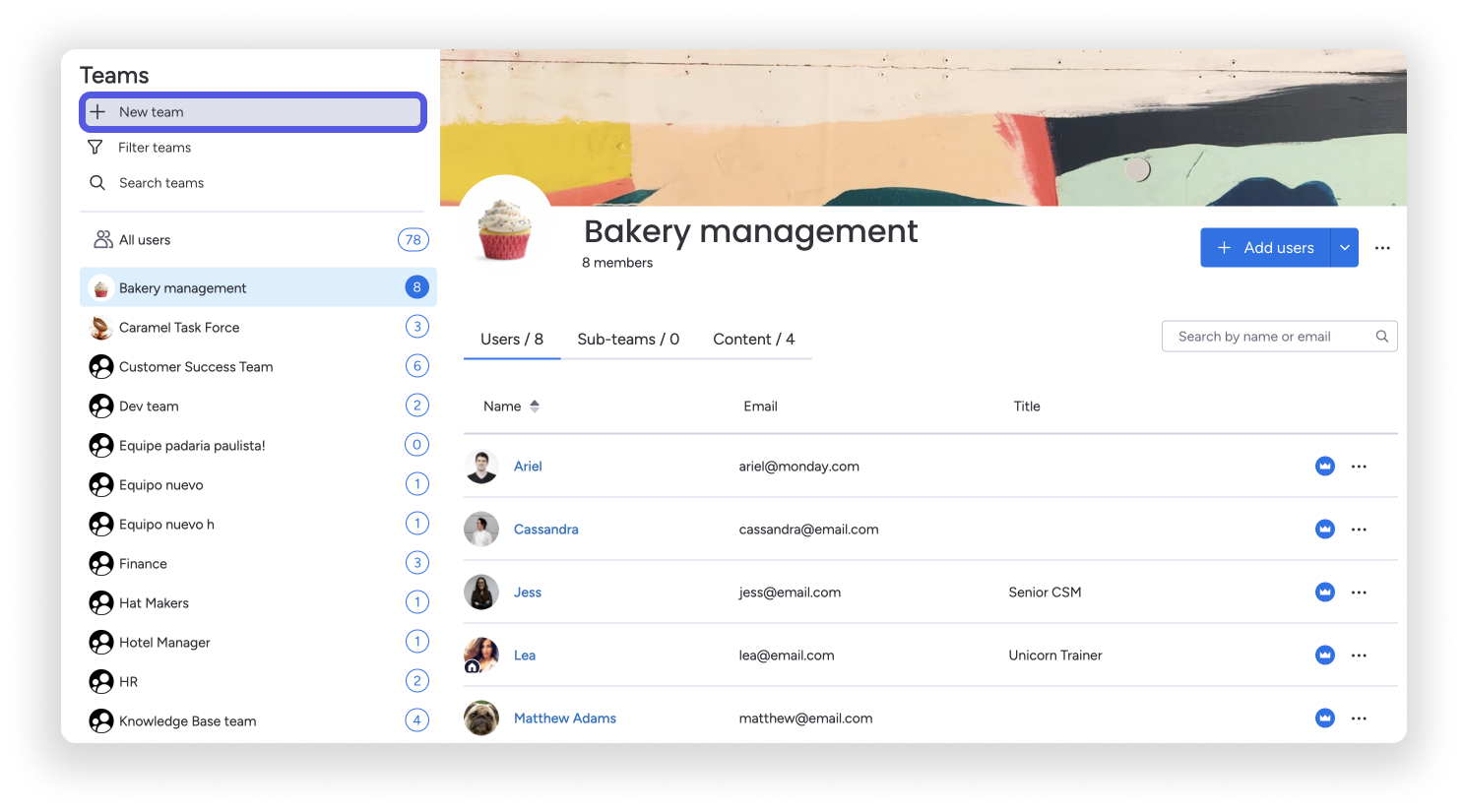 |
Monday.com is an operating system for work (Work OS) used to manage projects, workflows, and processes. It allows you to visualize your tasks, track progress, and collaborate with your team all in one spot.
Pros for Monday.com:
- Visual dashboard: Keep on top of the workflow by using boards, graphs, and timelines.
- Highly customizable: Create templates for just about any workflow.
- Team collaboration: Assign tasks, set deadlines, and track progress.
- Automation: Less manual work with automated notifications and task dependencies.
- Robust integrations: Everything from Slack and Gmail to Jira.
Monday.com’s Cons:
- Steeper learning curve: It takes time for new users to get up to speed.
- Overkill for small teams: If your projects are simple, using a sledgehammer on a thumbtack may be overkill.
- Pricing: Advanced features are only available on pricier plans.
What is Chanty?

Chanty is a team collaboration tool designed to streamline communication and enhance productivity. It offers a user-friendly platform for messaging, task management, and team coordination, bringing everything you need into one place.
Pros for Chanty:
- Unlimited messaging: Stay in constant communication with unlimited instant messaging for teams of all sizes, ensuring quick and easy collaboration.
- Kanban task manager: Keep tasks organized and track progress effortlessly with the intuitive Kanban board.
- Voice and video calls: Conduct seamless voice and video calls, with the ability to share your screen for better team collaboration.
- Affordable pricing: With competitive pricing plans, Chanty makes team collaboration accessible without breaking the bank.
Chanty’s Cons:
- Limited advanced integrations: While Chanty integrates with key apps, more advanced integrations may be available only on higher-tier plans.
- Fewer customization options: For teams needing highly specialized workflows, Chanty might not offer as much flexibility in customization as other platforms.
Slack vs Monday.com: Side-by-side feature comparison
| Feature | Slack | Monday.com | Chanty |
| Primary Use | Team communication | Project and workflow management | Team communication and task management |
| Integrations | 2,000+ integrations | 200+ integrations | 50+ integrations |
| Ease of Use | Intuitive for communication | Better for structured workflows | Simple, user-friendly |
| Customization | Moderate (channels, bots) | High (boards, templates, automation) | Moderate (task manager, team chat) |
| Searchability | Advanced search | Good for task-related queries | Good for communication and tasks |
| Mobile App | Excellent | Solid but complex | Easy-to-use and responsive |
| Free Plan Limitations | 90-day message history | Limited users and storage | Unlimited messaging, up to 10 users |
Slack vs Monday.com: Communication
Slack is all about real-time messaging, making it a very dynamic environment for team communication. With channels, teams may work on specific topics to keep discussions organized on point. It is not just about chatting in Slack; video calls, and direct messaging are possible, and it fits well with communication apps such as Zoom and Google Meet. What really sets Slack apart is how seamlessly it integrates with third-party apps, pulling in messages and notifications from external tools like Trello or GitHub. That’s perfect for teams that want a single hub for all their communications, without having to jump between platforms.
On the contrary, Monday.com takes a more structured and task-focused approach to communication, which ensures that every message serves a purpose in the workflow. While it does have some features of chat-around tasks, it doesn’t have those really spontaneous or broad communication channels that Slack does. Conversations are directly tied to tasks, so everything stays in context and organized. On Monday.com, you can comment on tasks, update the status of tasks, and mention team members to keep everyone aligned. Monday.com allows for more formalized communication, which is beneficial when teams need to focus on task details and not casual conversation.
At the same time, Chanty strikes a balance between both worlds. It provides real-time messaging and organized team communication through channels, much like Slack, but also integrates task management features, similar to Monday.com. With its simple interface and the ability to manage tasks in a Kanban board view, Chanty allows teams to stay connected while keeping communication focused on actionable outcomes. Whether you’re chatting with teammates or assigning tasks, Chanty offers an intuitive platform where communication and task management flow together seamlessly.
Slack vs Monday.com: Task management
Slack doesn’t have task management, though, and it’s not exactly its strong suit. You can create to-do lists within conversations, or integrate with project management tools like Asana and Trello to track tasks. This option provides a very quick way to assign and track tasks, but by itself, Slack doesn’t have a comprehensive in-platform task management system. It works well for teams that only need light task tracking and tend to manage their projects in other tools.
On the other hand,Monday.com is designed for task management and does the work appropriately. It allows the users to create tasks, delegate to team members, and then assign due dates while they keep track of progress via boards like Kanban, Gantt charts, and timelines. It is easy to track in which stage of the workflow the task dependency may fall with Monday.com and provide that level of detail not possible with Slack. For teams that need more hard-core task management systems, the opposite is true; Monday.com is an intuitive, fully integrated platform where tasks and progress tracking come together.
For teams looking for a balance between communication and task management, Chanty offers an integrated Kanban task manager. It lets you assign and track tasks while maintaining fluid communication within the same platform. This makes Chanty an ideal solution for teams that want to keep tasks organized and communication seamless without needing to jump between multiple tools.
Slack vs Monday.com: Design
Slack has a clean, modern design that’s easy to navigate, especially for users who have worked with chat-based apps before. It’s simple to use and quick to set up, with a very low learning curve. Slack’s interface can get a little cluttered when working with a lot of channels and integrations, but all in all, its ease of use in design makes it easy for new users to dive in and start communicating right away.
Monday.com has an aesthetically pleasing and intuitive interface, with workboards that you can customize according to your needs. The drag-and-drop functionality makes it easy to set up tasks and workflows. Its visual project views – Kanban and Gantt charts among others – offer clear insight into progress. Though highly flexible in design, the many features and customization options of Monday.com can overwhelm some users.
Chanty, on the other hand, strikes a balance between simplicity and functionality, offering a design that is both user-friendly and efficient. Its intuitive interface ensures easy navigation without the complexity found in other tools. Unlike platforms like Slack or Monday.com, Chanty keeps things straightforward, with everything neatly organized in one place. This makes it an excellent choice for teams that value clear communication and straightforward task management, without the need for excessive customization or clutter.
Slack vs Monday.com: Notifications
Slack’s notification system is one of its defining features. You’ll be alerted in real-time whenever there’s an update in a channel, a direct message, or if you’re mentioned in a conversation. This ensures that you’re always in the loop, especially in fast-paced environments. Slack offers customizable notification settings, allowing you to tailor what you get notified about and when. This makes it easy to avoid distractions, especially if you’re in multiple channels or working on different projects. However, some users find that the flood of notifications can be overwhelming, particularly in larger teams.
Monday.com’s notifications are more task-centric. They notify you of updates to tasks you’re following, comments made on tasks, or changes to project statuses. This system keeps notifications focused on the work at hand and prevents unnecessary alerts. Monday.com offers more control over which updates you receive, and notifications are directly tied to the tasks and projects you’re working on. This makes it easier to focus on important updates, but if your team relies on real-time, spontaneous communication, Slack might be more suitable.
Chanty provides a streamlined notification system that ensures you’re alerted for both task updates and team messages, without overwhelming you. With its focused notifications, Chanty lets you stay on top of team conversations and task progress in real-time.
Slack vs Monday.com: Search
Slack’s search feature is a powerhouse, built for speed and precision. Whether you’re hunting down an old message, a shared file, or something tucked away in an integrated tool, its advanced filters – by keyword, date, or person – help you find what you need in seconds. For teams drowning in constant communication and file sharing, this feature cuts through the clutter to get information without the headache of scrolling through endless threads. If your workflow relies on quick access to both internal messages and external resources, Slack’s search keeps everything within easy reach.
Monday.com, on the other hand, takes a more structured approach. Instead of sifting through a sea of conversations, its search zeroes in on tasks, projects, and workflows. Whether you’re tracking a project update, locating a specific file, or checking the latest task status, Monday.com delivers results with precision. While it may not match Slack’s flexibility in scouring external tools or sprawling discussions, it’s a sharp, work-focused engine built for project-centric teams.
Both platforms bring powerful search tools to the table, but choosing the best productivity tool depends on what you need: Slack for broad, cross-channel searches or Monday.com for laser-focused project tracking.
But Chanty provides an intuitive search function for messages, tasks, and files, allowing you to quickly find anything you need within the platform. Whether it’s for managing team communications or staying on top of tasks, Chanty ensures that finding information is as simple and efficient as possible.
Slack vs Monday.com: File Sharing and Storage
Slack and Monday.com both support file sharing, but they go about it a bit differently.
Within Slack, files can be directly uploaded into messages and shared across channels or in DMs. Files from other platforms, like Google Drive and Dropbox, can also easily integrate into Slack, making it seamless to share resources within the conversation. However, Slack’s free version does come with storage limits, which may be a serious drawback for large teams or when one has to share files quite often.
Monday.com provides better integration of task management with file sharing. It attaches files to their particular tasks and projects in order to ensure everything is well-organized and can be found with ease within the context of your workflows. This is a huge plus for teams needing to store a large volume of files since Monday.com offers unlimited file storage on its paid plans. If your team needs to store and organize files contextually, other than just sharing them in random conversations, Monday.com offers a more structured and scalable solution.
For teams looking for a balance of file sharing and communication, Chanty provides simple file-sharing capabilities that integrate directly into your team conversations and task manager. With unlimited messaging and a focused approach, sharing files and staying organized becomes more efficient in a single platform.
Slack vs Monday.com: Integrations
Slack does very well when it comes to integrations. With over 2,000 available apps, Slack seamlessly connects with a wide variety of third-party tools, ranging from project management apps like Trello and Jira to file-sharing platforms like Google Drive and Dropbox. Slack’s ability to integrate with such a broad range of tools makes it a central hub for many teams, allowing them to bring together their entire tech stack in one place. For teams relying on a lot of tools, Slack’s extensive integration options are a huge advantage.
Monday.com integrates with more than 40 integrations, including Slack, Google Drive, and Zoom. However, Monday.com integrations are more task-oriented, helping you connect the platform with tools that focus on project management and team workflows. While not as extensive as Slack, the integrations within Monday.com are designed to enhance its primary strength: task management. For teams looking to improve project workflows and task tracking, the integrations within Monday.com are both relevant and useful.
Chanty, though offering fewer integrations than Slack, includes essential ones like Google Drive and Zapier, making it easy to sync with your existing workflow. The ability to integrate task management and team communication into one platform gives Chanty a seamless, all-in-one solution for many teams.
Slack vs Monday.com: Security
Security in both tools is paramount. Slack provides enterprise-grade security where business users can leverage the power of end-to-end encryption, 2FA, and SOC 2 compliance. Enterprise plans for Slack offer even better security controls, such as DLPs and SSOs. However the free plan of Slack does not have strong security features, which may be a problem when it has to cater to bigger teams or enterprises dealing with critical information.
Security features are pretty strong on Monday.com too, including 2FA, encryption of data at rest, and ISO 27001 certification. The security behind Monday.com is to make sure your project data is kept safe, with more ways to customize this for enterprise users. Unlike Slack, Monday.com provides unlimited storage for file attachments on paid plans, ensuring your project files are secure and always available.
Chanty also prioritizes security with robust measures like end-to-end encryption, secure authentication, and 2FA for all accounts. Its simple, intuitive platform ensures that communication and task management remain secure without the complexity often seen in larger tools. Whether you are using the free or paid version of Chanty, your data remains protected with strong encryption protocols, offering a safe environment for teams of any size. Moreover, Chanty ensures transparency in its security practices, making it a reliable, cost-effective alternative for businesses seeking a solid solution with a focus on both collaboration and security.
Slack vs Monday.com: Support
Slack offers support via a very extensive help center, community forums, and email support. Premium support is only available with the paid plans, meaning users on the free tier will be reliant on the knowledge base and community forums. Generally, the support is pretty responsive, but it can be a big bummer for some that Slack does not offer live support on the lower-tier plans.
Monday.com offers 24/7 customer support to all of its subscribers, including direct chat and email, along with a rich help center featuring tons of useful content. Indeed, one of the many reasons developers like Monday.com is for its great customer support – super responsive, and always keen to help work out solutions. Account managers are reserved for enterprise customers; thus, big companies will enjoy the highest level of attention. Probably the biggest plus for constant teams seeking assistance in their project management needs is the ongoing support provided by Monday.com.
Chanty takes a similarly customer-focused approach, providing responsive support to all users, whether on free or paid plans. While it doesn’t offer live chat support for free-tier users, it ensures prompt assistance through email and an extensive help center. Chanty’s support team is known for being highly helpful and easy to reach, ensuring a smooth experience for teams of all sizes. For teams that need both ease of use and good support without having to jump through hoops, Chanty offers a practical, reliable alternative, keeping communication and productivity running without delays.
Slack vs Monday.com: Pricing Comparison
Slack pricing
| Plan | Price | Key Features |
| Free | $0 | 90-day message history, 10 integrations, 1:1 voice and video calls |
| Pro | $8.75/user/month | Unlimited message history, unlimited integrations, group calls, and enhanced search |
| Business+ | $15/user/month | Advanced admin tools, SSO, compliance exports, and guaranteed uptime SLA |
| Enterprise Grid | Custom pricing | Enterprise-level scalability, organization-wide search, advanced security, and 24/7 support |
Slack keeps things pretty simple: The free plan is perfect for small teams that only need basic communication. As you grow, the Pro plan unleashes unlimited message history and integrations-perfect for scaling teams. Business+ is designed for enterprises needing advanced controls and security. The Enterprise Grid plan is tailored for large and complex organizations, offering the ultimate in customization, scalability, and support.
Monday.com pricing
| Plan | Price | Key Features |
| Free | $0 | Basic boards, up to 2 users, limited storage, and basic support |
| Basic | $9/user/month | Unlimited boards, simple tracking, file uploads, and prioritized support |
| Standard | $12/user/month | Timeline views, automation (250 actions), guest access, and enhanced integrations |
| Pro | $19/user/month | Advanced reporting, unlimited automation, time tracking, and private boards |
The free plan from Monday.com is handy only for individual usage or for small startups that are testing the platform. As teams grow, the Basic plan adds unlimited boards and file storage, while the Standard introduces powerful visual tools like Gantt charts. Last but not least, the Pro plan caters to large teams needing full customization and automation.
While Slack concentrates its pricing model on scaling the needs around communication, Monday.com scales project management demands with its tiers. Both have their flexibility, but the accentuation of pricing structures occurs for their core strengths: Communication for Slack and Task Management for Monday.com.
Chanty Pricing
| Plan | Price | Key Features |
|---|---|---|
| Free | $0 | Unlimited messaging, file sharing, voice/video calls |
| Business | $3/user/month | Task management (Kanban), group video calls, integrations with tools like Google Drive |
| Enterprise | Custom pricing | Advanced admin tools, enterprise-grade security, team collaboration at scale |
Chanty offers a more affordable solution, particularly for small and mid-sized teams. Its free plan provides unlimited messaging and file sharing, with options to scale to the Business plan for task management and integrations. The Enterprise plan is designed for large teams requiring advanced features like security and admin controls, but at a lower price point than Slack’s Enterprise Grid.
How to integrate Slack and Monday.com for better teamwork
Slack and Monday.com work really well together, making it super easy to keep your team in the loop while managing tasks. Here’s how you can use this integration to stay organized and save time:
- Get Notifications in Slack:
Connect Monday.com to Slack, so you can get notifications about task updates, due dates, or changes directly in your Slack channels. This way, you won’t miss anything important without having to jump between apps. - Create Tasks Right from Slack:
With the Monday.com app in Slack, you can create new tasks or update existing ones without leaving your chat. Just use a simple command to add a task and assign it to someone – it’s that easy! - Trigger Monday.com Workflows in Slack:
You can set up automation so that actions in Slack update Monday.com automatically. For example, when someone marks a task as done in Slack, Monday.com can update the board for you. Less work, more done! - Pin Important Updates:
Pin key messages or task updates in Slack that match Monday.com boards. This way, everyone can quickly see what’s going on without having to dig through a bunch of messages.
By connecting Slack’s quick communication with Monday.com’s detailed project tracking, your team can stay on top of everything, all in one place. It’s all about working smarter, not harder!
Slack vs Monday.com: Which should you choose?
In the battle of Slack vs. Monday.com, the winner really depends on your team’s priorities and workflow style. If real-time communication, impromptu brainstorming, or seamless integrations keep your team going, then Slack is probably your tool of choice. As a matter of fact, it’s aimed at people who need one central place for communication easy to set up and use.
If you want to get a powerful tool to manage projects, workflows, and tasks in a high degree of customization and with much clarity visually, then Monday.com is the best fit. It’s perfect for teams who need to have detailed task tracking, automation, and clear workflow organization.
Which one is better, though? Well, ultimately, both tools have their own strengths. It really comes down to your team size, communication needs, and complexity of tasks. Both offer free plans, so trying them out would be a great way to see which one fits the style of your team best.
Choose Slack if:
- Your team needs a powerful communication tool.
- You prioritize real-time conversations and integrations.
- You’re a small-to-medium-sized business with existing project management software.
Choose Monday.com if:
- Your team focuses on project and task management.
- You need visual workflows and automation.
- You’re a larger organization or plan to scale soon.
And if you’re looking for a smooth, easy-to-use alternative that combines seamless communication and collaboration, give Chanty a try-it might be just what your team needs!
Choose Chanty if:
- You want an all-in-one platform for both communication and task management.
- You’re looking for a straightforward, user-friendly tool that doesn’t overwhelm with complexity.
- You need seamless communication and collaboration at an affordable price.
Final Verdict: Slack, Monday.com, or Chanty?
- Slack is great for messaging but lacks project management.
- Monday.com is fantastic for task tracking but isn’t built for seamless conversations.
- Chanty combines both – giving your team the best of both worlds without the complexity or high price.



